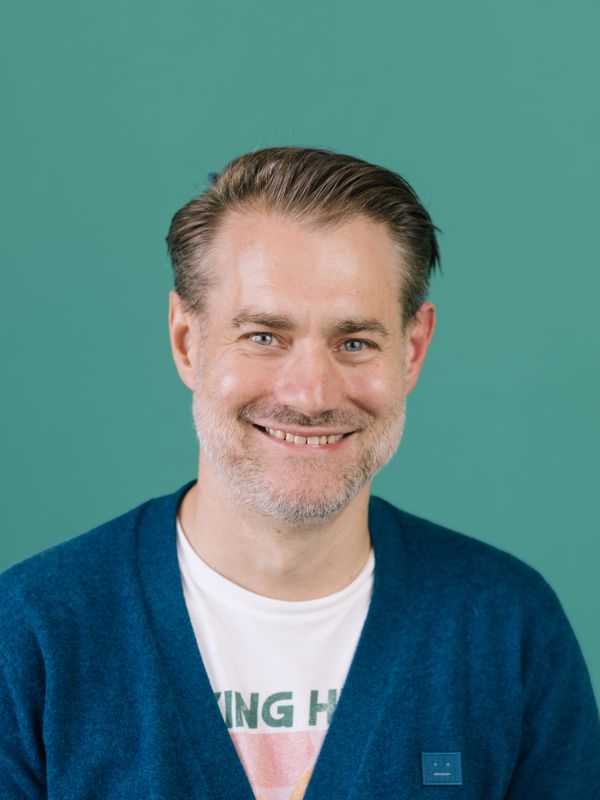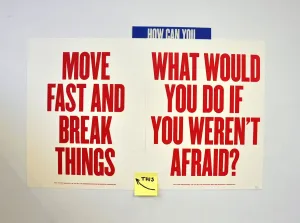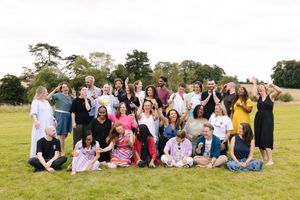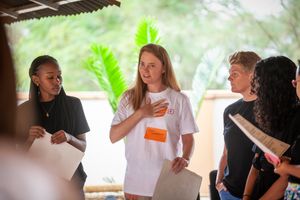
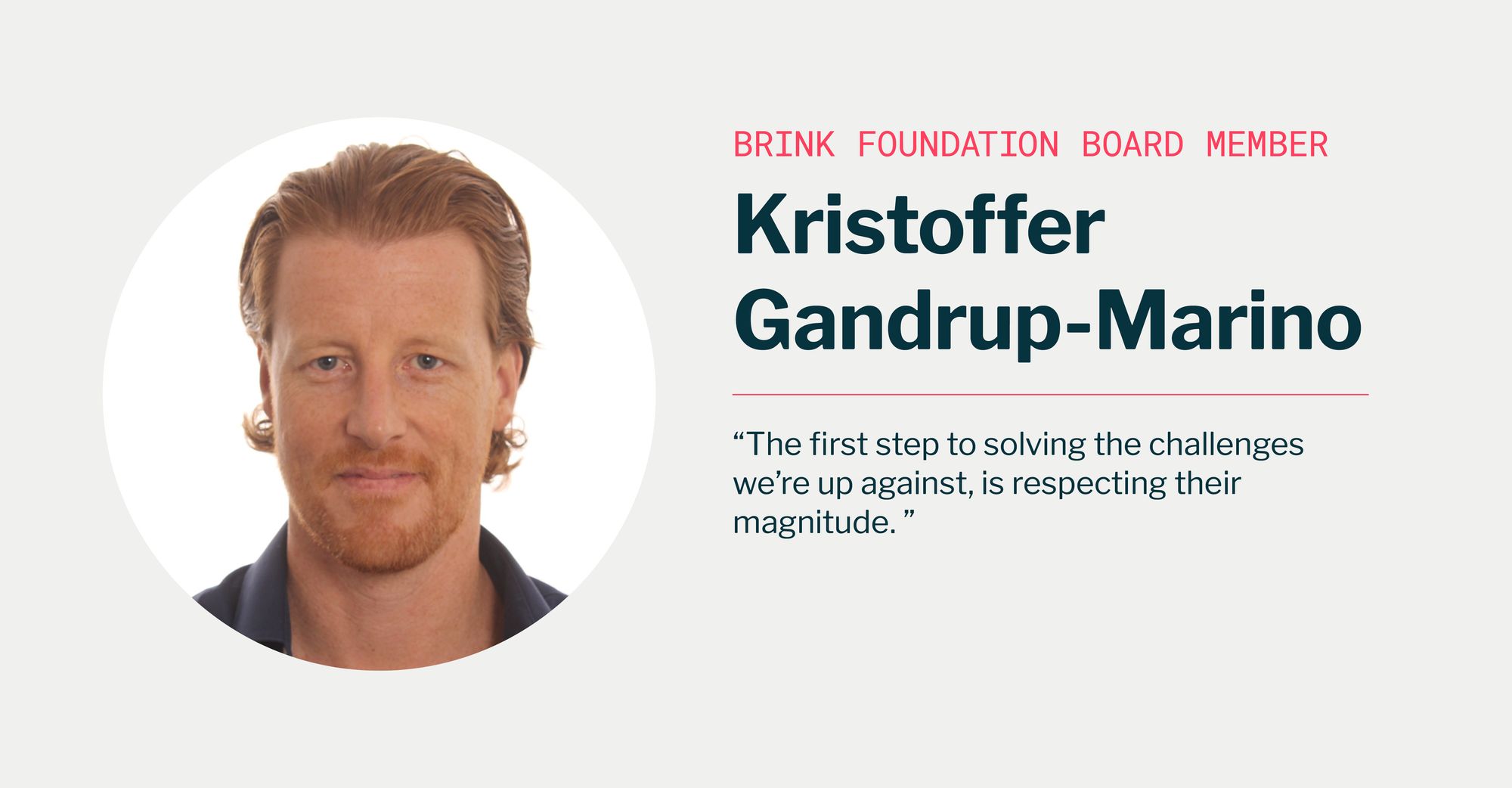
Ahead of the launch of Brink Foundation, we spoke with our founding Board Members to learn a little more about their backgrounds and experience, their ambitions for the future at the Foundation and what impact they hope to see our work having.
“This is my favourite type of question!” says Kristoffer Gandrup-Marino when we sit down to ask him about new types of private and public partnerships and how they might push the boundaries of global health.
Fortunately, it’s a question that he is more than qualified to answer.
Over the last 15 years Kristoffer has spent time on all sides of the table in the innovations space, a path which has led him to his current position as Chief of Innovation at UNICEF. But over the last decade and a half he has also been an investor, entrepreneur and consultant; and it’s this mix of depth and breadth of experience that has given Kristoffer a unique and valuable perspective on what successful innovation looks like and the ways genuine impact might be achieved.
“The fundamental reason I joined the Brink Foundation is that we face a great opportunity to bring those modalities together,” Kristoffer says in answer to our question. “And when I say that, I don’t mean the private and public merging to become one. I mean we need to recognise that the modes of operating are fundamentally different (and they always will be, as the goals are different), so we need to leverage the power of that difference.”
I think the efficiency of the commercial logic combined with the impact ambition of the public logic, is what can enable us to truly make a difference in progressing the results within the global space.
“As a core to this argument, I believe the efficiency inherent in the commercial logic - in terms of delivering results - greatly outweighs that of what you see in the public sector, which tends to be focused on activities rather than results. On the other hand, the commercial logic has limitations, in that it cares about the P&L (profit and loss) and less about what it delivers that against. Whereas the public sector, (in the broadest sense of the word), can define exactly what the targets are that need to be delivered against, because there isn’t that P&L and shareholder accountability, I think the efficiency of the commercial logic combined with the impact ambition of the public logic, is what can enable us to truly make a difference in progressing the results within the global space.”
In Kristoffer’s vision of the future, this merging of logics and approaches doesn’t result in giant, hybrid institutions. Instead he believes that, in order to bring about genuine and longstanding change, the development community has to evolve into a more agile network of diverse actors that not only spans the public/private sectors, but actively harnesses those differing aims, methods and skillsets to create new and dynamic ways of working
“If you look at global trends, I think that there is an increasing scepticism amongst the population of both institutions and aid” Kristoffer says. “Globally, this is sometimes explained away as the effects of extremism, but we must also acknowledge the challenges with development. By this I mean that we've had huge results in terms of vaccinating children for example, but nowhere near as much success when it comes to solving some of the more fundamental issues like that of state building and independence. Equally, there's an acknowledgement that private business - again in the broadest sense - plays an increasingly large role. There's many attempts globally to try to create better links with the private sector. But often it's based on very little understanding of the dynamics and the differences, or how you activate that commercial logic and leverage the power of that difference."
A perfect pairing
Kristoffer’s frustration at that lack of understanding of the dynamics of logic is tempered by the potential that organisations such as Brink have in driving in-country work.
“One of my wishes is that we see things continue to accelerate in the right direction by stimulating local business building,” he says. “This in-country work is something that Brink can truly make a difference with. Usually, it involves bringing in totally different people, or those with different expertise - which goes back to the discussion around private versus public sectors and where they can leverage one another. With the private sector, we could think about them delivering products, or delivering a service. It could also look like the private sector covering out of pocket expenses, or a private entity being the service provider of publicly funded services. By activating this way of working - having private entities running services that are paid for by the government, either directly or through other schemes - we’re presented with enormous opportunity and scope to ensure that the most disadvantaged can have access to services that they may otherwise not be able to access.”
For Kristoffer, there is significant potential in the combination of sectors that could lead to publicly-funded systems, delivered by a private entity with the efficiency of its ‘P&L logic’, leaving the ‘public sector’ side free to focus on ensuring that people have access to the right type and level of services. And It’s this kind of innovative approach where Kristoffer sees the Brink Foundation making its biggest impact.
“I think that Brink Foundation has the ability to truly iterate through and try some of these things out,” he continues. “Its setup, structure and experience in the sector will enable it to test out some modalities to see if there's merit and progressing those that have promise.”
In the longer term, Kristoffer wants to see the Foundation operating at a larger scale. “I tend to think that there's a lot of focus on just the catalytic stage in our sector,” he explains. “We all want to be there at that stage, but then things tend to lose momentum when it comes to scaling. I'm hoping Brink Foundation will have that lens to not only take on the early stages, but to also play a pivotal role in transitioning that into solutions that are implemented (either services or products) at scale.”
Finding the sweet spot
Kristoffer first worked with Brink as part of the Better Futures CoLab, and it was there that he first saw how a mix of skills and expertise was assembled under the framework of behavioural innovation. But, he admits that, even if he hadn’t seen the Brink way of working in practice, he would have still been won over, just from reading the website.
“The Brink website spoke right to my heart and my brain,” he says. “The aspirations for the work Brink does, is exactly the type of stuff I love and what I think can truly make a difference. That’s why I’m excited to be a part of this, but what excites me the most is the people. The people with the right sort of overarching agenda and drive to do good.”
Again, it’s that range of experience and the ability to synthesise the various methods and approaches he has been a part of that will make Kristoffer such a valuable part of the Brink Foundation’s mission.
“In my past, I’ve done real estate investment and hardcore venture capital investments,” he explains “and then on the flip-side, I've worked in civil society and the UN. I always feel like I have a foot in both camps. But, what drives me fundamentally, is that, at its core, capitalism has an efficiency that is through the roof, relative to what you experience in the public sector. But the limitation of that logic is that it delivers what people want, without attention to what's good for the world. Which takes me back to my point about needing to be able to bridge these two areas to leverage the strength of those different logics.”
Of course, Kristoffer knows that we cannot just smash the methods of capitalism into the values of the public sector and hope for the best. But he does believe that there is a version of that venn diagram that leverages the best from both sectors and creates a powerful set of motivators.
“We are flawed if we think that capitalism will all of a sudden set aside the profit logic,” he admits, “but I also think we're flawed if we think that the public sector could, all of a sudden, be just as efficient. This is why I think the ideal combination is a sweet spot between them both, with the public setting the goals to be achieved, and building in the right incentives for private entities to deliver against. I sincerely don't believe it's one above the other, but instead about recognising the opportunities and limitations of both logics, and trying to the best of our ability to activate those at the ‘peak level’."
Respect and patience
As for what’s next, Kristoffer knows that the first step to solving these kinds of challenges is respecting their magnitude. “Very often, there’s that idea of ‘We need to accelerate and do everything within half the time'’" he says, “but often that does more harm than good. Of course, it's great to be ambitious, but if it gets to the point where the ambition is so much out of sync with reality, it often distorts your approach in a negative direction.”
I think that ‘impatient patience’ is a critical thing in order to truly make an impact beyond just this big level of thinking that Brink is already so great at. Respecting the timeline and respecting the challenge is critical.
I think the opportunity for impact is in the fact that it's a marathon rather than a sprint,” he continues, ”maybe not even a marathon actually, but 10 double Ironman! Respecting that means how we approach it is pivotal and it's one of the challenges when you come at this from a very private sector orientation. I think that ‘impatient patience’ is a critical thing in order to truly make an impact beyond just this big level of thinking that Brink is already so great at. Respecting the timeline and respecting the challenge is critical.
“Right now I’m excited to see what we can do and, with Brink’s proven expertise in the world of innovation and development, I’m hopeful that we’re going to make a solid, concrete impact."
Read more about Brink Foundation.

